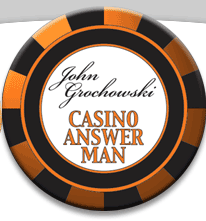"Well, should I or shouldn't I?"
The voice belonged to Mark, who had attended a couple of seminars I'd
given. I'd seen him in casinos a couple of times before. This time, he
was sitting at a Caribbean Stud table as I was passing, checking out
available games and table limits.
I stopped and asked what it was he should or shouldn't do.
"Make the progressive bet. It's terrible odds, isn't it? Should I just skip it?"
I didn't want to hold up the game. I told him the bet was a
long-shot, but it was his decision. He could find me later if he really
wanted a lengthy discussion.
"What the heck," he said. "I came to gamble."
He plunked in his dollar on the progressive bet, and was dealt a pair
of 8s. The progressive bet was a loser, but he won on his ante and got
his bet back --- the dealer didn't have a qualifying hand.
Mark grinned. "Won enough for a few more bets on the jackpot, anyway."
I moved on, but Mark found me later while I was playing a little video poker.
"Did I catch you at a bad time?"
No, I told him, I was ready for a break.
"So tell me what you really think of that progressive bet? Is it something I should just skip?"
That depends on why you're playing Caribbean Stud, I told him. Are
you just relaxing a bit over a game that's easy to play, or are you
jackpot hunting?
"A little of both, really. Mostly I play blackjack. Basic strategy
stuff --- I never really got into counting cards. Still, you have to pay
attention, and when my concentration starts to go, I do something else
for a while. Maybe I'll fool around with 20 bucks on the nickel slots,
or sometimes I'll play a little Caribbean Stud."
I nodded. Basic strategy for Caribbean Stud is much easier than that
for blackjack. The cost is high, though. A blackjack basic strategy
player can get the house edge down to about a half percent on a six-deck
game, a few tenths more or less depending on house rules. At Caribbean
Stud, even if you play well, the house edge is 5.2 percent of the ante
or 2.6 percent of total action.
"I know that, and it's a break-time game for me. But I also like the
idea that I can win pretty big, pretty fast when the cards run good. You
don't have to have great cards, full houses or flushes or anything, but
get some two pairs and some three of a kinds and it's really sweet.
When you're being paid 2-1 or 3-1 on hands like that instead of just
even money like in blackjack, that stack of chips can grow in a hurry."
It can shrink in a hurry, too, I reminded him. Winning hands are much
less frequent in Caribbean Stud than in blackjack, and most of the
winners are pair or lower hands, or hands in which the dealer doesn't
qualify. On those, you'll still get only even money.
"Right, but there's always the chance at a big one, and some real
money. I'm not greedy. I know the royal flush is pretty unlikely, but
give me 7-1 on a full house and I'm a happy man. Give me 20-1 on four of
a kind, and it makes my day. If I throw in the extra dollar and get
back another $75 on the full house or $100 on four of a kind --- it's
pretty exciting."
I told him the question is whether the excitement is worth it on a bet you win so rarely.
"But if you watch the jackpot level, you can get a pretty decent house edge, right? It's not always an awful bet."
On the standard pay table --- $50 on a flush, $75 on a full house,
$100 on four of a kind, either $5,000 or 10 percent of the jackpot on a
straight flush or the full jackpot on a royal flush --- the break-even
point is about $263,000.
But the house edge isn't the entire issue. Even if the jackpot is
very large and the house edge is very low, or players have the edge, the
likelihood of winning is very low. In five-card stud poker, there are
2,598,960 possible hands. Only four of those are royal flushes --- one
royal per 649,740 hands. The most frequent winners on the progressive
bet are flushes --- about one per 509 hands. Add up all the winners, and
you'll still average a winner only once per 273 hands.
"And that doesn't change with the bigger jackpot?"
That doesn't change. Frequency of winning hands remains the same, it's only the size of potential rewards that changes.
"But do you know how horrible I'd feel if I got dealt the royal and
didn't bet the progressive? I think I'd rather lose the dollars than to
risk that."
Then that's your answer, I told him.
"Still, one winner per 273 hands? That's tough," he said, smiling as he left. "I think I'll keep a countdown."

No comments:
Post a Comment